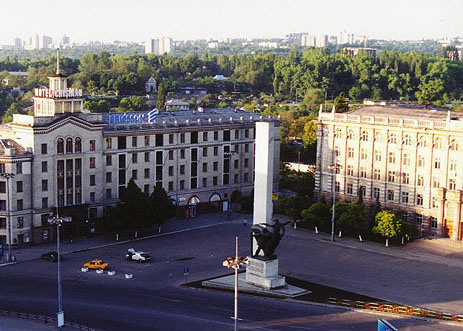Moldova wrapped up a national vote on a constitutional amendment for the reintroduction of direct presidential elections Sunday, but not without being challenged by low voter turnout and a hacker attack on its new computer systems, dpa reported.
The pro-Europe government supports the suggested constitutional change as a way of resolving a long-running political crisis in the former Soviet republic.
But only 22 per cent of registered voters had cast ballots in the referendum by 7 pm, according to Central Election Committee (CEC) data - raising the prospect of the turnout perhaps being too low to validate the vote.
The referendum, which if approved would cancel the current system of parliament selecting a president, needs a 30-per-cent national turnout to be valid.
The poll was the first-ever Moldovan national vote using computerized voter rolls. But CEC officials said a hacker attack led to morning delays in the operation of its website and damaged some digitally stored voter rolls.
The CEC was instead using manual vote counts and relying on paper- based voter roll data, but voting results would "be available only a little later than expected," CEC leader Evgeny Stirbu said.
Communist officials opposing the referendum's passage had alleged that the government was using the computer system to inflate turnout numbers artificially.
"This is why the (CEC) computers are having problems," Communist Party spokesman Yury Muntian had said earlier in the day, according to an Infotag news agency report. "This will allow them to falsify the vote result."
But Stirbu pledged that the votes would be tallied transparently and the referendum result would be free and fair. Initial vote counts are expected to be announced on Monday evening.
More than 250 international observers were reportedly in the country to monitor polling.
Transnistrian security forces in the village of Korzhova blocked the operation of one polling site, but voting elsewhere in the village and across Moldova ran without major problems, according to the RIA Novosti news agency.
Russian-speaking Transnistria seceded from Romanian-speaking Moldova after a civil war ending in 1992. Korzhova, located along a disputed ceasefire line, saw Transnistrian police block the operation of some Moldovan polling sites twice in 2009.
Mihai Gimpu, a senior coalition member and the acting Moldovan president, said he was "sure" the referendum would pass.
"Today, the people will teach some politicians a lesson. The Communists will have a huge defeat," he said.
The referendum proposes replacing the current system of electing a president by a 61-member majority of the 101-seat parliament with a direct national popular vote.
The current ruling four-party coalition controls 53 seats in the legislature and has been in power since July 2009.
The opposition Communist Party controls the remaining 47 seats in the national parliament, and has refused to give the coalition the single vote necessary to select a president.
The impasse has left Moldova in a political crisis for more than a year. Legislation approved by the coalition-controlled parliament cannot be signed into law, because the president's office is vacant.
Bloody street riots in April 2009 followed a parliamentary election that gave the Communists victory. Mass protests against vote fraud in the Communists' favour forced a repeat election in July, won by the coalition.






